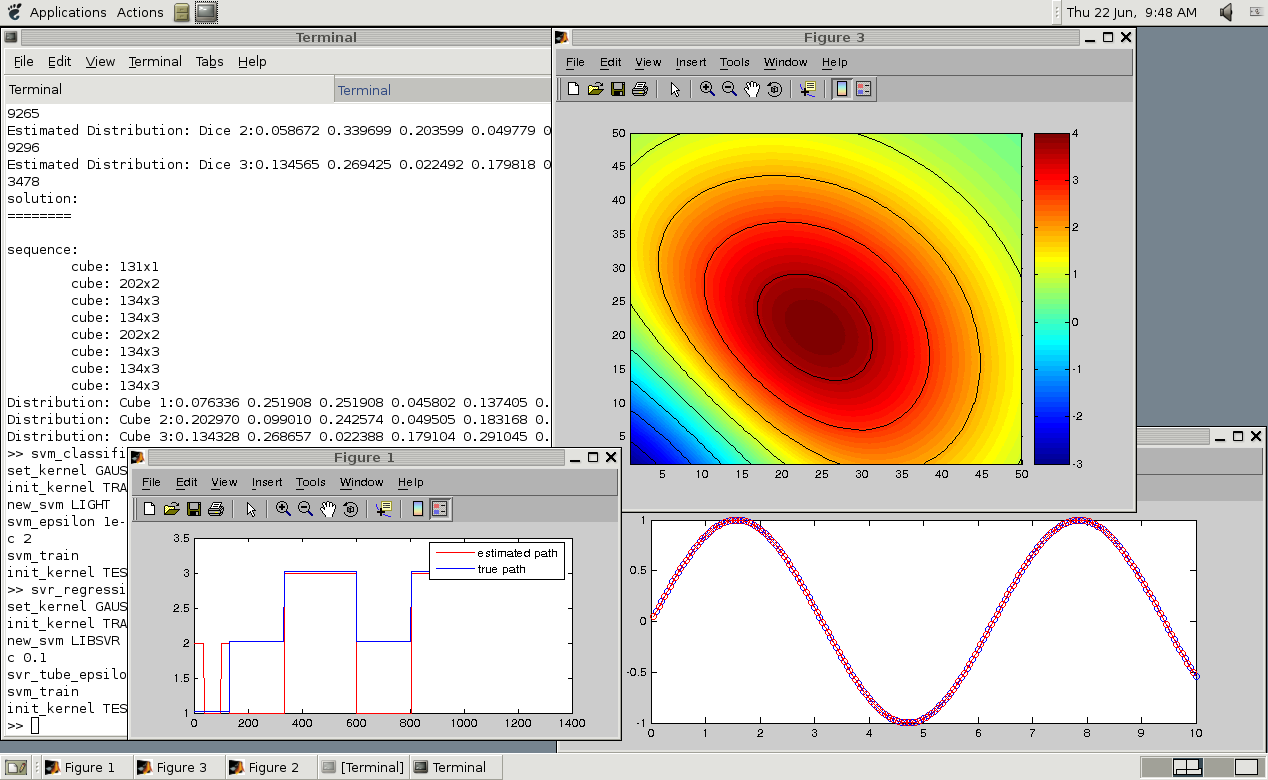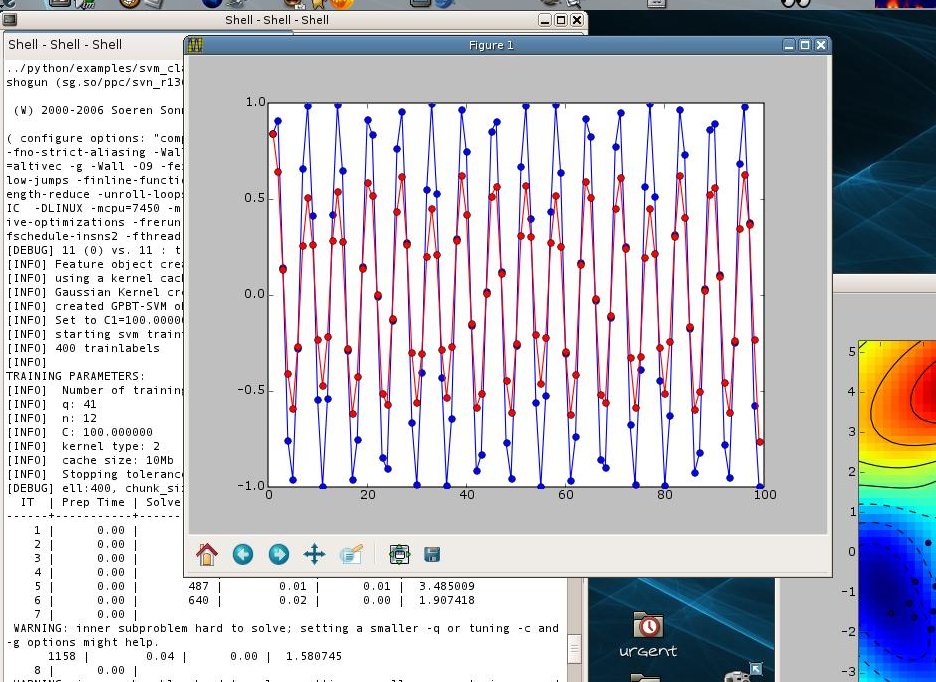SHOGUN is an open source software project designed from the offset to provide a machine learning toolbox targeted at large scale kernel methods, and specifically designed for Support Vector Machines (SVM). The software can be easily used from within various programming languages, including C, C++, Python, Octave, Matlab, Java, C#, Ruby, Lua, UNIX Shell, and R.
The application offers a standard SVM (Support Vector Machines) object that can interface with various SVM implementations. It also includes many linear methods, such as Linear Programming Machine (LPM), Linear Discriminant Analysis (LDA), (Kernel) Perceptrons, as well as some algorithms that can be used to train hidden Markov models.
Features at a glance
Key features include one class classification, multiclass classification, regression, structured output learning, pre-processing, built-in model selection strategies, test framework, large scale learning support, multitask learning, domain adaptation, serialization, parallelized code, performance measures, kernel ridge regression, vector regression support and gaussian processes.Additionally, it supports multiple kernel learning, including q-norm MKL and multiclass MKL, supports the Naive Bayes, Logistic Regression, LASSO, k-NN and Gaussian Process Classification classifiers, supports linear programming machine, LDA, Markov chains, hidden Markov models, PCA, kernel PCA, Isomap, multidimensional scaling, locally linear embedding, diffusion map, local tangent space alignment, as well as laplacian eigenmaps.
Furthermore, it features Barnes-Hut t-SNE support, kernel normalizer, sigmoid kernel, string kernels, polynomial, linear and gaussian kernels, hierarchical clustering, k-means, BFGS optimization, gradient descent, bindings to CPLEX, bindings to Mosek, label sequence learning, factor graph learning, SO-SGD, latent SO-SVM and sparse data representation.
Under the hood and availability
SHOGUN is proudly written in the Python and C++ programming languages, which means that it’s compatible with any GNU/Linux operating system where Python and GCC exist. It is available for download as a universal source archive, so you can install it on any Linux kernel-based operating system.What is new in this release:
- Features:
- Fully support python3 now
- Add mini-batch k-means [Parijat Mazumdar]
- Add k-means++ [Parijat Mazumdar]
- Add sub-sequence string kernel [lambday]
- Bugfixes:
- Compile fixes for upcoming swig3.0
- Speedup for gaussian process' apply()
- Improve unit / integration test checks
- libbmrm uninitialized memory reads
- libocas uninitialized memory reads
- Octave 3.8 compile fixes [Orion Poplawski]
- Fix java modular compile error [Bjoern Esser]
What is new in version 3.1.1:
- Fix compile error occurring with CXX0X
- Bump data version to required version
What is new in version 3.1.0:
- This version contains mostly bugfixes, but also feature enhancements.
- Most important, a couple of memory leaks related to apply() have been fixed.
- Writing and reading of shogun features as protobuf objects is now possible.
- Custom Kernel Matrices can now be 2^31-1 * 2^31-1 in size.
- Multiclass ipython notebooks were added, and the others improved.
- Leave-one-out crossvalidation is now conveniently supported.
What is new in version 2.0.0:
- It includes everything which has been carried out before and during the Google Summer of Code 2012.
- Students have implemented various new features such as structured output learning, gaussian processes, latent variable SVM (and structured output learning), statistical tests in kernel reproducing spaces, various multitask learning algorithms, and various usability improvements, to name a few.
What is new in version 1.1.0:
- This version introduced the concept of 'converters', which enables you to construct embeddings of arbitrary features.
- It also includes a few new dimension reduction techniques and significant performance improvements in the dimensionality reduction toolkit.
- Other improvements include a significant compilation speed-up, various bugfixes for modular interfaces and algorithms, and improved Cygwin, Mac OS X, and clang++ compatibility.
- Github Issues is now used for tracking bugs and issues.
What is new in version 1.0.0:
- This version features interfaces to new languages including Java, C#, Ruby, and Lua, a model selection framework, many dimension reduction techniques, Gaussian Mixture Model estimation, and a full-fledged online learning framework.
What is new in version 0.10.0:
- Features:
- Serialization of objects deriving from CSGObject, i.e. all shogun objects (SVM, Kernel, Features, Preprocessors, ...) as ASCII, JSON, XML and HDF5
- Create SVMLightOneClass
- Add CustomDistance in analogy to custom kernel
- Add HistogramIntersectionKernel (thanks Koen van de Sande for the patch)
- Matlab 2010a support
- SpectrumMismatchRBFKernel modular support (thanks Rob Patro for the patch)
- Add ZeroMeanCenterKernelNormalizer (thanks Gorden Jemwa for the patch)
- Swig 2.0 support
- Bugfixes:
- Custom Kernels can now be > 4G (thanks Koen van de Sande for the patch)
- Set C locale on startup in init_shogun to prevent incompatiblies with ascii floats and fprintf
- Compile fix when reference counting is disabled
- Fix set_position_weights for wd kernel (reported by Dave duVerle)
- Fix set_wd_weights for wd kernel.
- Fix crasher in SVMOcas (reported by Yaroslav)
- Cleanup and API Changes:
- Renamed SVM_light/SVR_light to SVMLight etc.
- Remove C prefix in front of non-serializable class names
- Drop CSimpleKernel and introduce CDotKernel as its base class. This way all dot-product based kernels can be applied on top of DotFeatures and only a single implementation for such kernels is needed.
What is new in version 0.9.3:
- Features:
- Experimental lp-norm MCMKL
- New Kernels: SpectrumRBFKernelRBF, SpectrumMismatchRBFKernel, WeightedDegreeRBFKernel
- WDK kernel supports amino acids
- String Features now support append operations (and creation of
- python-dbg support
- Allow floats as input for custom kernel (and matrices > 4GB in size)
- Bugfixes:
- Static linking fix.
- Fix sparse linear kernel's add_to_normal
- Cleanup and API Changes:
- Remove init() function in Performance Measures
- Adjust .so suffix for python and use python distutils to figure out install paths
What is new in version 0.9.2:
- Features:
- Direct reading and writing of ASCII/Binary files/HDF5 based files.
- Implemented multi task kernel normalizer.
- Implement SNP kernel.
- Implement time limit for libsvm/libsvr.
- Integrate Elastic Net MKL (thanks Ryoata Tomioka for the patch).
- Implement Hashed WD Features.
- Implement Hashed Sparse Poly Features.
- Integrate liblinear 1.51
- LibSVM can now be trained with bias disabled.
- Add functions to set/get global and local io/parallel/... objects.
- Bugfixes:
- Fix set_w() for linear classifiers.
- Static Octave, Python, Cmdline and Modular Python interfaces Compile cleanly under Windows/Cygwin again.
- In static interfaces testing could fail when not directly done after training.



Comments not found